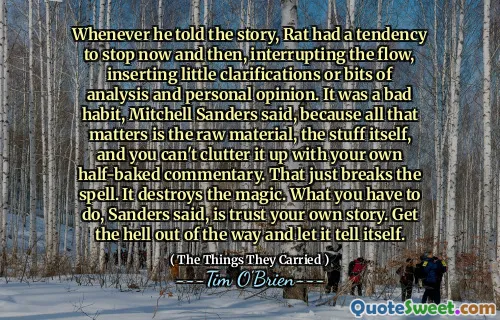
Whenever he told the story, Rat had a tendency to stop now and then, interrupting the flow, inserting little clarifications or bits of analysis and personal opinion. It was a bad habit, Mitchell Sanders said, because all that matters is the raw material, the stuff itself, and you can't clutter it up with your own half-baked commentary. That just breaks the spell. It destroys the magic. What you have to do, Sanders said, is trust your own story. Get the hell out of the way and let it tell itself.
This passage from (The Things They Carried) underscores the importance of authenticity and trust in storytelling, especially within the context of recounting true experiences. The narrator reflects on Rat’s tendency to interject commentary during storytelling, which is contrasted with the more effective approach of allowing the story to unfold naturally without interference. The image of disrupting the flow resonates deeply because it illustrates how external commentary, no matter how insightful or sincere, can weaken the emotional and narrative impact of a story. The core message emphasizes that stories—particularly personal, raw stories—hold a unique power when told honestly and without unnecessary embellishment or correction. When a storyteller intervenes with unnecessary analysis or clarification, they risk dismantling the spontaneous magic that makes the story compelling and visceral. Trusting the story to speak for itself is a reminder of the authenticity required to convey truth. It encourages storytellers to step back and let their experiences resonate without over-editing or over-explaining, allowing listeners to draw their own meanings. This lesson extends beyond storytelling into various aspects of communication and expression, advocating for genuine pauses, silences, and reliance on one’s narrative voice to evoke profound understanding and connection. The quote echoes a timeless truth about the power of simplicity and the vital importance of trusting one’s own inner voice when sharing authentic experiences.








